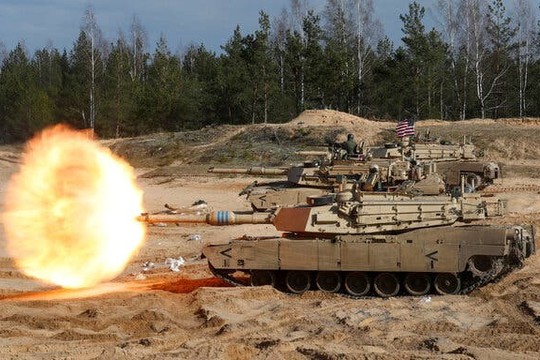American M1 Abrams battle tanks during a NATO military exercise in Latvia last year.
Photo: Reuters
The United States’ recent promise to ship advanced M1 Abrams battle tanks to Ukraine was a swift response to a serious problem. The problem is that Ukraine is losing the war, - writes “The New York Times”.
Not, as far as we can tell, because its soldiers are fighting poorly or its people have lost heart, but because the war has settled into a World War I-style battle of attrition, complete with carefully dug trenches and relatively stable fronts. Such wars tend to be won — as indeed World War I was — by the side with the demographic and industrial resources to hold out longest. Russia has more than three times Ukraine’s population, an intact economy and superior military technology.
The Biden administration has other plans. It is betting that by providing tanks, it can improve Ukraine’s chances of winning the war. In a sense, the idea is to fast-forward history, from World War I’s battles of position to World War II’s battles of movement.
The Biden strategy has a bad name: escalation. Beyond a certain point, the United States is no longer “helping” or “advising” or “supplying” the Ukrainians, the way it did, say, the Afghan mujahedeen during the Cold War. It is replacing Ukraine as Russia’s main battlefield adversary. It is hard to say when that point will be reached or whether it has been already.
This sudden policy lurch has the look of an accident.
With whom is Russia at war — Ukraine or the United States? Russia started the war between Russia and Ukraine. Who started the war between Russia and the United States?
In an age of smart devices, robotics and remote control, the United States’ involvement in the war has always been greater than it appeared. The computer-guided rocket artillery that Ukraine has received from the United States may seem analogous to the horses and rifles that a government might have sent to back an insurgency in the old days. They look at first like traditional weapons, albeit advanced ones.
But there is an important difference.
Most of the new weapons’ destructive power comes from their being bound into an American information network, a package of services that keeps working independently of the warrior and will not be fully shared with the warrior. So the United States is participating in these military operations at the moment they happen. Abrams tanks require experienced technicians for training and repair. Will these technicians be brought onto the battlefield from the United States?
Then we will have a situation analogous to the introduction of “advisers” into Vietnam in the early 1960s. “This is not an offensive threat to Russia,” President Biden said of the Abrams tank shipments last month. He’s entitled to his opinion, but it is probably not shared by the Russian leadership.
The Russian invasion of Ukraine has to do with a complicated set of post-Cold War historical trends (like America’s striking post-Cold War rise and its more recent relative decline) and economic accidents (like the vicissitudes of fossil fuel prices).
But it is also the latest chapter of a continuing geostrategic story in which the plot has changed little over the centuries: The largest country by area on the planet has no reliable exit into the world. The most reliable route runs through the Black Sea, where it crosses the trade routes that link the civilizations of Asia to the civilizations of Europe.
Speaking last week at the 80th anniversary of the Soviet victory over Germany at the battle of Stalingrad, President Vladimir Putin of Russia described the present war as a similar effort. Russians say the war is about preventing the installation of an enemy military stronghold on the Black Sea, strong enough to close off what has for centuries been Russia’s main access to the outside world.
Without Ukraine, Russia can be turned into a vassal state. That NATO intends to bring about the subjugation, breakup or even extinction of Russia may be true or false — but it will not sound implausible to a Russian.
Russians say this is a war in which Russia is fighting for its survival and against the United States in an unfair global order in which the United States enjoys unearned privileges.
In this confrontation Mr. Putin and his Russia have fewer good options for backing down than American policymakers seem to realize, and more incentives to follow the United States all the way up the ladder of escalation.
read more in our Telegram-channel https://t.me/The_International_Affairs

 11:05 11.02.2023 •
11:05 11.02.2023 •























